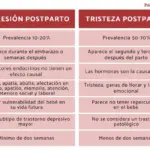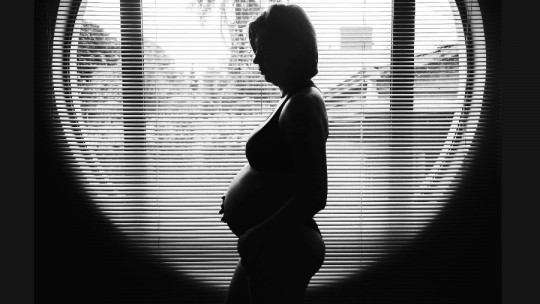Postpartum psychosis is a serious mental disorder characterized by loss of contact with reality, delusional thoughts, hallucinations, and disorganized behavior. Although they share the context of the period after childbirth, it is important to note that it is not the same as postpartum depression or postpartum anxiety.
In this sense, there are women who suffer from physical, emotional and cognitive conditions after giving birth. In this PsychologyFor article, we will talk about the case of Postpartum psychosis: what it is, symptoms, causes and treatment
What is postpartum psychosis
Postpartum psychosis is a serious psychiatric disorder which affects some women shortly after giving birth. It is characterized by loss of contact with reality, which can manifest as hallucinations (perceiving things that are not present), delusions (persistent false beliefs), extreme agitation, confusion, mood changes, and disorganized behavior.
Risk factors include a personal or family history of psychiatric disorders, especially bipolar disorder or schizophrenia. Postpartum psychosis can develop very quickly, often within the first two weeks after delivery and it may be a medical emergency.
Differential diagnosis of postpartum psychosis
Although the DSM-V(1) It does not have a specific classification, the differential diagnosis of postpartum psychosis involves distinguishing it from other conditions that may present similar symptoms, but have different causes or characteristics. Some of the conditions that should be considered in the differential diagnosis include:
- Postpartum depression with psychotic symptoms: Although postpartum depression and postpartum psychosis are different disorders, some women with postpartum depression may experience psychotic symptoms, such as hallucinations or delusions. However, in postpartum depression with psychotic symptoms, depressive symptoms are prominent and usually precede psychotic symptoms.
- Schizophrenia: Although rare, schizophrenia can begin during the postpartum period. However, it is characterized by psychotic symptoms that persist beyond the postpartum period and are usually present for a prolonged period. Additionally, schizophrenia can present negative symptoms, such as emotional flattening or impairment in social functioning.
- Bipolar disorder: Postpartum psychosis sometimes overlaps with bipolar disorder, especially if the woman has a family history of bipolar disorder or has experienced manic or hypomanic episodes in the past.
Symptoms of postpartum psychosis
Symptoms of postpartum psychosis can vary in severity and presentation from woman to woman, but generally include a combination of the following signs:
- hallucinations: Perceiving things that are not present, such as hearing voices, seeing things that are not there, or feeling unusual tactile sensations.
- Delusions: false and persistent beliefs that are not based on reality. Delusions in postpartum psychosis can be of different themes, such as paranoia (believing that someone is trying to harm you), grandiosity (believing that you have special powers or are someone extremely important), or guilt (believing that you have done something terrible).
- Extreme agitation or excitement: Intense feelings of nervousness, restlessness, or excitement that may manifest in agitated or restless behavior.
- Confusion: disorientation or difficulty concentrating or maintaining organized thought.
- Mood changes: Rapid, extreme swings in mood, which may include episodes of euphoria, irritability, intense sadness, or anxiety.
- Disorganized behaviors: Behaviors that seem out of place or inappropriate, such as speaking incoherently, behaving impulsively, or having difficulty performing everyday activities.
- Deregulations in sleep patterns: insomnia or extreme changes in sleep patterns, such as sleeping too little or too much.
It should be noted that the isolated presence of any of these symptoms does not necessarily imply a picture of postpartum psychosis. In this sense, the Diagnosis must be made by a mental health professional specialist, who will be in charge of evaluating the patient’s clinical conditions.

Causes of postpartum psychosis
Postpartum psychosis can be triggered by a combination of biological, psychological and environmental factors. Although its origin is not completely understood, some of the possible causes and risk factors include:
- History of psychiatric disorders: Women with a personal or family history of psychiatric disorders, such as bipolar disorder, major depression, or schizophrenia, may be at increased risk of developing postpartum psychosis.
- Obstetric trauma: Traumatic experiences during childbirth, such as serious medical complications, difficult births, or negative experiences with medical staff, may increase the risk of postpartum psychosis. In this article you will find more information about What obstetric violence is and examples.
- Genetic and biological factors: It has been suggested that certain genetic variants may increase vulnerability to postpartum psychosis, although more research is needed to fully understand this connection.
- Social factors: The pressures of the social environment, family mandates and ideas of happiness can cause significant stress and trigger postpartum psychosis.
Treatment of postpartum psychosis
Treatment of postpartum psychosis usually involves a combination of medical and psychological interventions. Here are common treatment options:
- Hospitalization: In severe cases of postpartum psychosis, hospitalization may be necessary to provide intensive care and ensure the safety of mother and baby. Allows for complete evaluation and appropriate medical management of symptoms.
- Drug therapy: Antipsychotics are the main treatment for postpartum psychosis. These medications can help control psychotic symptoms, such as hallucinations and delusions. Antidepressants and mood stabilizers may also be prescribed if there are symptoms of depression or bipolar disorder.
- Psychological therapy: Individual and family therapy may be beneficial in helping the mother and her family understand postpartum psychosis and develop strategies to manage symptoms. In these cases, cognitive behavioral therapy (CBT) and supportive therapy are often used.

This article is merely informative, at PsychologyFor we do not have the power to make a diagnosis or recommend a treatment. We invite you to go to a psychologist to treat your particular case.
If you want to read more articles similar to Postpartum psychosis: what it is, symptoms, causes and treatment we recommend that you enter our Clinical Psychology category.
- American Psychiatric Association (2013). Diagnostic and Statistical Manual of Mental Disorders (5th edition). Arlington: Panamericana Medical Publishing.
Bibliography
- Fonseca Villanea, C. (2018). Postpartum Psychosis. Sinergia Medical Magazine, 3 (8), 7-12.
- Medina-Serdan, E. (2013). Differences between postpartum depression, postpartum psychosis and postpartum sadness. Medigraphic Magazine, 27 (3), 185-193.








